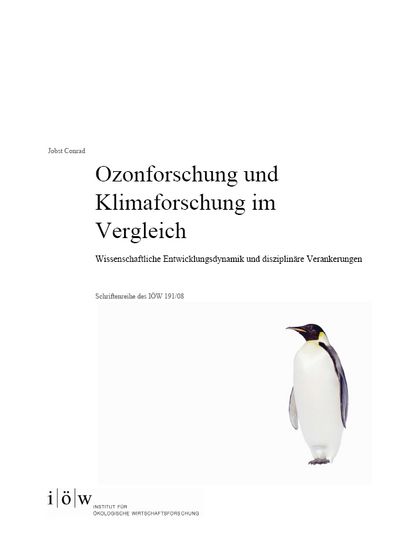Ozonforschung und Klimaforschung im Vergleich: Wissenschaftliche Entwicklungsdynamik und disziplinäre Verankerungen
Ozone research and climate research are two prototype examples of a scientific development dynamics which is generated by the interaction of scientific observation and discovery, of societal problem perception and risk definition, and of institutionalized exchange and reconciliation of interests in terms of massive research promotion and grants, supra-nationally organized research programs and projects, extensive assessments and boundary organizations disposing of internal and external scientific legitimacy. The study describes how this development dynamics occurs in a frequently asynchronous, partly fragmented and contradictory, protracted historical process which partly has been coordinated and organized consciously over time. Although the social embedding and structural features of ozone research and climate research show considerable parallels and the organizational forms of ozone research
and of the ozone regime partly served as model and impulse for analogous efforts in climate research and the climate regime, both research areas have to be clearly distinguished concerning their size, research objects and kind of scientific problems, on the one hand, and concerning the societal scope of necessary measures to solve the social problems of stratospheric ozone depletion and of limiting climate change, on the other hand. In sum, ozone research as well as climate research can be read and interpreted as exemplary (successful) evidence
• that problem oriented multidisciplinary research increasingly becomes the dominant mode
of scientific research in modern societies,
• that their corresponding finalizibility in fact depends on the theoretical and technical/metrological maturity of the subjects and (sub-)disciplines used,
• that organizational couplings are installed and necessary for this purpose in order to arrange coordination, bargaining and transfer processes between science and politics (or the economy) to mutually translate and solve scientific, technical and/or practical problems for both sides in a long-term effective and successful manner,
• and that the function-specific borders between the science system and other sociofunctional systems are maintained in this process so that no arbitrary mixture of different rationalities or even a abolition of its functional differentiation may occur.



